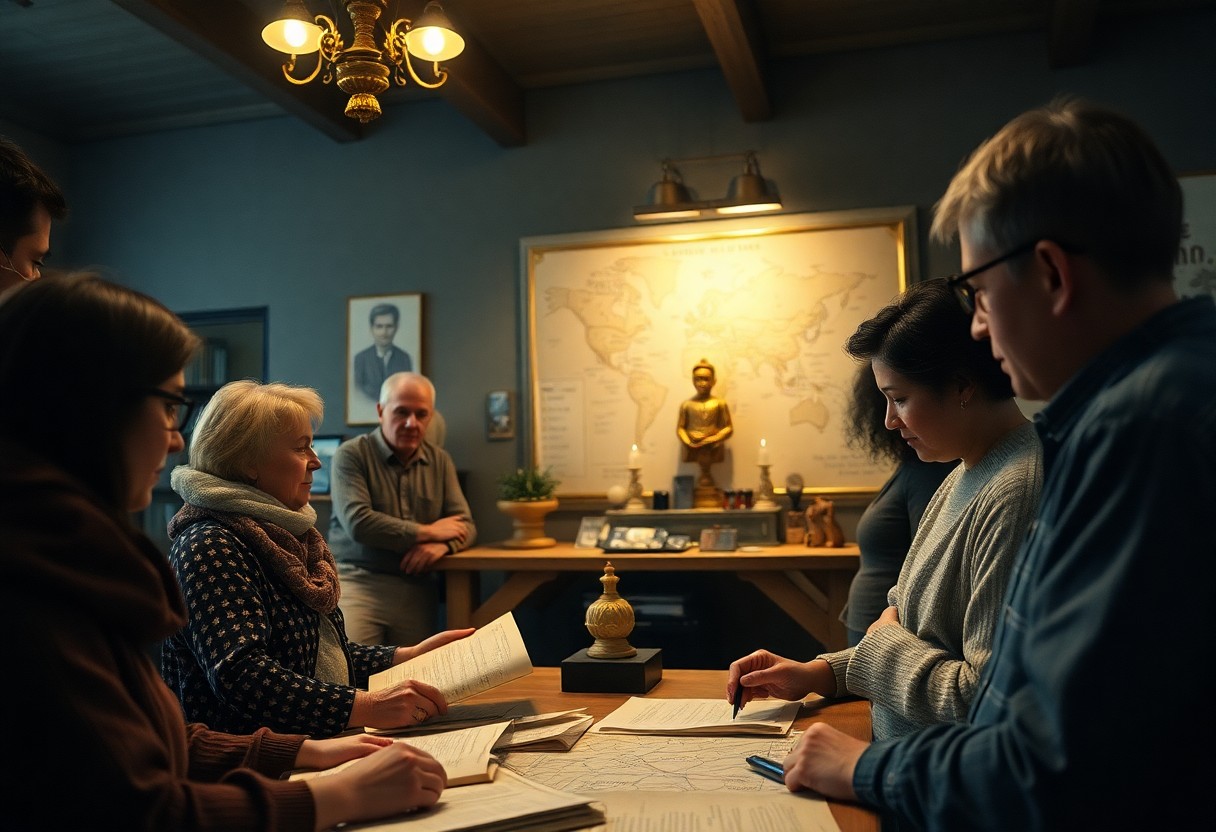Kuldevi exploration begins with understanding your family’s heritage and cultural roots. To successfully uncover your kuldevi, you will need to gather information about your surname and its traditional associations. Utilizing family records and engaging with community elders can provide invaluable insights. Additionally, you may want to research regional customs and practices that relate to your lineage. This journey not only connects you with your spiritual guide but also enriches your family’s narrative. In this guide, we will explore effective strategies for uncovering your kuldevi through surname identification.
Table of Contents
Key Takeaways:
- Surname Significance: Understanding the history and meaning of your surname can provide insights into your family’s origins and associated kuldevi.
- Community Resources: Engaging with community groups or temples linked to your culture can help uncover connections to specific kuldevi based on common surnames.
- Consult Family Records: Exploring family trees and oral histories can reveal personal connections and traditional worship practices related to your kuldevi.

Understanding Kuldevi
A Kuldevi is a family deity worshipped by various Hindu clans, often representing the guardian spirit of the lineage. This divine entity holds significant spiritual value and serves as a connection between you and your ancestral roots. By understanding your Kuldevi, you can foster a deeper sense of belonging and strengthen the bond with your heritage.
Definition of Kuldevi
With the rich tapestry of Hindu culture, a Kuldevi is a specific goddess that families revere, often passed down through generations. She embodies the spiritual strength and protection bestowed upon your family, making her an necessary figure in your lineage.
Importance of Kuldevi in Hindu Culture
On a broader scale, the significance of Kuldevi transcends mere family worship. It encapsulates a sense of unity and identity among members as you collectively honor your heritage, creating an enduring bond. The rituals performed in her name not only protect your family but also carry forward cultural traditions.
Another necessary aspect of the Kuldevi is the role she plays in your family’s prosperity and well-being. By paying homage to her during auspicious occasions, you invoke her blessings for harmony and success in your life. Furthermore, your devotion serves as a reminder of your roots, instilling values of respect and gratitude towards your ancestors. Embracing the customs surrounding your Kuldevi can enrich your spiritual journey and offer a sense of security as you navigate the complexities of life.
Factors Influencing Kuldevi Selection
If you’re exploring your heritage, the selection of your kuldevi can be influenced by various factors. These can include:
- Family history
- Regional practices
- Cultural traditions
Knowing these influences can assist you in identifying your family’s divine protector.
Family Lineage
You may find that your kuldevi selection is deeply rooted in your family’s lineage. Each clan or family may have a distinct kuldevi, often passed down through generations, connecting you with your ancestors and their spiritual beliefs.
Regional Influences
Kuldevi identification often varies based on geographic location. Each region has specific deities that are revered, and your direct environment can strongly shape the kuldevi associated with your family name.
Factors such as local traditions, historical events, and geographical significance can lead people to venerate certain deities over others. For instance, in some areas, a specific goddess may signify prosperity and protection, while in others, a different one may represent strength and resilience. The spiritual significance you assign to your kuldevi might therefore reflect not only personal belief but the communal values of your region.
How to Identify Your Kuldevi
Not every family has a clear understanding of their kuldevi, which can make identification challenging. To pinpoint the goddess associated with your lineage, begin by delving into your family’s history and traditions. Often, oral narratives and family customs can provide some insightful clues, linking your surname to specific deities worshipped by your ancestors.
Researching Your Surname
Little clues can often be found by researching your surname. Look for its origins, connections to geographical regions, and historical significance. Different communities may have specific kuldevis tied to their surnames, and understanding this context can greatly aid your search.
Gathering Family History
Now, consider gathering your family history to uncover potential links to your kuldevi. Speak with elder family members, examine into family trees, and explore religious practices your family has followed over generations.
For instance, gathering anecdotes from relatives may reveal how your ancestors worshipped their kuldevi, including rituals or festivals they celebrated. You may discover that specific goddesses were revered during significant family events, such as marriages or childbirth. Furthermore, your family’s regional roots could provide insights into which local deities were recognized. This exploration not only aids in identifying your kuldevi but also helps you appreciate the spiritual legacy your family carries.
Tips for Locating Kuldevi Records
Your journey to identifying your Kuldevi can be simplified by following these crucial tips:
- Explore your family genealogy and history.
- Document any local traditions associated with your surname.
- Utilize community resources and organizations focused on family heritage.
- Seek out temple records or regional archives.
This approach will provide you with valuable insights into your Kuldevi.
Utilizing Online Resources
Kuldevi research has become increasingly accessible through various online platforms. Websites dedicated to genealogy and community history can offer databases that may include significant names associated with your family traditions. Social media can also connect you with others from similar backgrounds who might share your quest for knowledge. Take advantage of online forums and specialized groups that discuss Kuldevi worship and practice.
Consulting with Family Elders
With the wisdom and experience of your family elders, you can uncover valuable information about your Kuldevi. Often, they hold stories and insights that span generations.
Understanding your family’s history is crucial in this regard. Elders can provide you with anecdotes and details that are often lost to time. They may also highlight the specific rituals or practices connected to your Kuldevi. However, be cautious of variations in traditions as they may differ across branches of the family. Engaging deeply with these conversations can lead to important discoveries about family roots and beliefs, enriching your understanding of your heritage.

Engaging with Community
Once again, connecting with your community can provide valuable insights into finding your kuldevi. Engaging with others who share your heritage may lead you to information that is not readily available online. Participate in discussions and be open to sharing your experiences, as this will foster relationships that can deepen your understanding of your cultural roots.
Joining Local Religious Groups
You can deepen your search for your kuldevi by joining local religious groups that focus on your specific cultural background. These groups often hold prayers, rituals, and discussions that center around deities important to your community, providing you with a supportive environment to explore and understand your heritage.
Attending Cultural Gatherings
Engaging in cultural gatherings is another effective way to uncover information about your kuldevi. These events are not only an opportunity to celebrate your traditions but also to meet individuals with similar backgrounds who may have valuable knowledge to share. Make connections and exchange stories that could lead you to discover your kuldevi.
It is imperative to approach these gatherings with an open heart and mind. Engaging with community members can facilitate meaningful discussions about family traditions, rituals, and even personal experiences related to your kuldevi. You may learn about specific ceremonies where the presence of your kuldevi is honored or even come across artifacts that carry historical significance. The relationships you build at these events could serve as a network of support, enhancing your journey of discovery.
Practices to Honor Your Kuldevi
All traditions associated with honoring your Kuldevi are meaningful and serve to strengthen your connection with the divine. Engaging in these practices can enrich your spiritual journey, providing you with guidance and blessings. By establishing a dedicated space for worship at home or participating in community rituals, you can cultivate a deeper understanding of your ancestral roots and receive the protective energy of your Kuldevi.
Rituals and Offerings
Offerings to your Kuldevi are an necessary part of honoring her presence in your life. You can present items such as flowers, fruits, and sweets at the altar or during festive occasions, believing that these offerings symbolize your devotion and gratitude. Additionally, lighting diyas and reciting prayers or mantras specific to your Kuldevi can further strengthen your bond and invoke her blessings.
Festivals Celebrating Kuldevi
Festivals dedicated to your Kuldevi are vibrant occasions that bring communities together in celebration and reverence.
With each festival, you will experience a unique flavor of devotion through rituals, processions, and communal prayers that honor your Kuldevi. These celebrations often involve colorful decorations and elaborate functions, creating an atmosphere of joy and spirituality. Participating in these events deepens your connection to your heritage while allowing you to express your gratitude for her guidance and blessings. Engaging in these festivals can provide a sense of belonging and reinforce your commitment to honor her throughout the year.
Final Words
Now that you have an understanding of how to find your kuldevi by surname, you can begin your journey of discovery. Researching your family history and connecting with your community can provide valuable insights. Additionally, online resources can guide you through this spiritual exploration. For a comprehensive guide, you can refer to How To Find Your Kuldevi and Kuldevata – Cosmic Kamya. Embrace the opportunity to connect with your ancestral roots and honor your kuldevi.
FAQ
Q: How can I determine my kuldevi based on my surname?
A: Identifying your kuldevi or family deity through your surname involves a few steps. Generally, surnames can indicate which community or caste you belong to, which can guide you in locating your kuldevi. Start by researching the cultural traditions associated with your surname and its regional origins. You can reach out to family elders who may have knowledge regarding the family lineage and its associated deities. It may also help to explore online forums or community groups relevant to your surname, where members share similar questions and experiences.
Q: Are there specific resources I can use to find information about kuldevi tied to my surname?
A: Yes, several resources can aid in your search for kuldevi related to your surname. Consider visiting local temples that cater to your community, as priests and devotees there might offer insights. There are also community websites and social media groups dedicated to traditions, where people from similar backgrounds discuss their kuldevi. Books on regional customs, marriage rituals, and traditional practices often include sections on kuldevi. Additionally, genealogical research websites may provide useful context about familial relationships and devotional practices.
Q: Is it common for multiple surnames to share the same kuldevi?
A: Yes, it is quite common for various surnames to share the same kuldevi, especially within certain communities and regions. Many families from the same caste or community tend to worship the same deity, often as a means of preserving cultural heritage and religious practices. This shared devotion can be traced back through generations, leading to a collective reverence for a particular kuldevi. If your surname is linked to such a community, it may indicate that your kuldevi is also worshipped by other families with similar surnames.